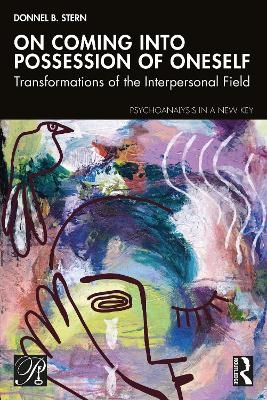
On Coming into Possession of Oneself
Routledge (Verlag)
978-1-032-68887-9 (ISBN)
This book is Donnel B. Stern’s latest contribution to the kind of understanding of the psychotherapeutic and psychoanalytic process offered by field theory.
Stern anchors his understanding of therapeutic action in the freedom of both patient and analyst to create a meaningful experience with minimum inhibition. The field’s capacity to generate meaning—and thus to make possible fully realized human living—rows from its freedom to respond spontaneously to the feelings, wants, and needs of its participants. To whatever extent this spontaneity is diminished, as it is in unconscious mutual enactment, we can be sure that some part of the field is frozen or otherwise rigidified. This position serves as the foundation of the psychoanalysis that Stern practices. The analyst aims to feel their way into compromises in the field, and then do whatever they can to grasp and dissolve them, knowing that they will have to be visited repeatedly, and dissolved again. These insights into interpersonal and relational field theory lead to descriptions of clinical interventions that are focused on the moment-to-moment emotional experience of both the patient and the analyst.
With valuable contributions to theory and emotionally immediate clinical vignettes, this book is essential for all psychoanalysts and psychoanalytic psychotherapists wishing to understand how the analyst’s interventions grow from the analyst’s emotional involvement in the clinical process.
Donnel B. Stern, training and supervising analyst, member of the faculty at the William Alanson White Institute, and adjunct clinical professor of psychology at New York University.
1. Introduction: Transformations of the Interpersonal Field Part One: The Formulation of Experience in the Clinical Situation 2. On Coming into Possession of Oneself: Witnessing and the Formulation of Experience 3. Distance and Relation: Emerging from Embeddedness in the Other 4. Interpretation: Voice of the Field 5. Feels Like Me: Formulating the Embodied Mind 6. How Does History Become Accessible? Reconstruction as an Emergent Product of the Interpersonal Field 7. How I Work with Unconscious Process, Part 1: A Case Example 8. How I Work with Unconscious Process, Part 2: The Emergence of Meaning from Unformulated Experience Part Two: Dissociation 9. Dissociation and Unformulated Experience: A Psychoanalytic Model of Mind 10. Unformulated Experience, Dissociation, and Nachträglichkeit 11. Dissociative Multiplicity and Unformulated Experience: Commentary on Diamond 12. Dissociative Enactment and Interpellation 13. From Interpersonal Field to Mind in the Work of Philip M. Bromberg Part Three: Comparative Studies 14. Field Theory and the Dream Sense: Continuing the Comparison of Interpersonal/Relational Theory and Bionian Field Theory 15. Otherness within Psychoanalysis: On Recognizing the Critics of Relational Psychoanalysis 16. Can There be a Psychoanalysis Without Unconscious Phantasy? Unformulated Experience and the Multiple Self
| Erscheinungsdatum | 26.07.2024 |
|---|---|
| Reihe/Serie | Psychoanalysis in a New Key Book Series |
| Verlagsort | London |
| Sprache | englisch |
| Maße | 156 x 234 mm |
| Gewicht | 616 g |
| Themenwelt | Geisteswissenschaften ► Psychologie ► Psychoanalyse / Tiefenpsychologie |
| Medizin / Pharmazie ► Medizinische Fachgebiete ► Psychiatrie / Psychotherapie | |
| ISBN-10 | 1-032-68887-4 / 1032688874 |
| ISBN-13 | 978-1-032-68887-9 / 9781032688879 |
| Zustand | Neuware |
| Haben Sie eine Frage zum Produkt? |
aus dem Bereich


